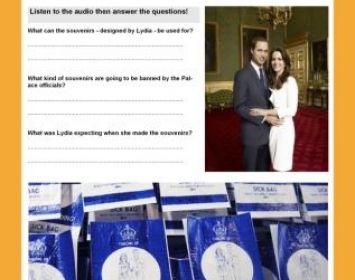Letölthető tartalmak
Listen to the article and then choose the right answer.
1) Why does the article say the Queen is known for her stoicism?
a) Because she is not often taken to hospital.
b) Because she doesn’t want anyone to fuss over her.
c) Because she prefers going to places in her own car.
2) What did the Queen do before going to the hospital?
a) She awarded a medal.
b) She got engaged.
c) She took a rest at Windsor Castle.
3) What sickness did the Queen have?
a) None. She was in good health and spirits.
b) She had some kind of a virus.
c) She had a virus transmitted by insects.
4) Did she change any of her plans because of her sickness?
a) Only her husband changed his plans to stay at home with her.
b) She cancelled some programs.
c) No, business was as usual.
5) How did her family react?
a) They rushed with her to the hospital and then went home to wait.
b) They knew what was happening but did not go to visit her.
c) They visited her at the hospital and stayed with her until she was better.
Answers: 1) b, 2) a, 3) b, 4) b, 5) b
Now match the words with their synonyms:
1) fuss
2) debilitating
3) long-standing
4) let down
5) speculate
6) vomit
7) reluctantly
8) stress
9) merely
10) inconvenience
a) emphasize
b) worry
c) throw up
d) difficulty
e) with hesitation
f) suppose
g) only
h) disappoint
i) weakening
j) fixed
Answers: 1) b, 2) i, 3) j, 4) h, 5) f, 6) c, 7) e, 8) a, 9) g, 10) d
Stoicism is what she is known for – and even as the Queen was taken to hospital for the first time in a decade last night, she insisted that there must be ‘no fuss’. Despite suffering from debilitating sickness, the 86-year-old refused to allow an ambulance to collect her. And as she waited for her car to pick her up instead, Her Majesty even decided that she might as well honour one more long-standing engagement. She awarded a favourite female member of staff a medal for long service in her private apartments at Windsor Castle, where she had been advised to rest. A source said: ‘It would have to be something extremely serious for her to let a loyal member of her household down.’ Doctors have speculated that the Queen is suffering from norovirus, the winter vomiting bug that closes hundreds of hospital wards every year. Well-placed sources said that after handing to Janet Doel, her housemaid at Windsor Castle, a Bar to the Royal Victorian Medal (silver) yesterday, the Queen insisted on walking to her car by herself, before also walking in through the hospital doors at the King Edward VII Hospital in Central London . Her Majesty did – ‘reluctantly’ – agree to cancel her engagements for the next week, including a high-profile visit to Rome, which indicates that the stomach bug which struck on Friday has taken its toll. But aides were asked to stress that she was in ‘good health and good spirits’, and said she regarded the hospital stay as merely a ‘minor inconvenience’. And it will be business as usual for her husband, the Duke of Edinburgh, who remained at home and will undertake a solo public engagement today. It is due to be a normal working day for Philip as he attends an event as an Honorary Member of the Imperial Poona Yacht Club at the Royal Thames Yacht Club in Kingston. Indeed, none of the Queen’s immediate family is expected to visit her during her stay – though they were being continually updated about her condition last night.
source: daily.co.uk
decade – évtized
to insist – ragaszkodni valamihez
no fuss – semmi hűhó
to suffer – szenvedni
debilitating – legyengítő
to refuse – megtagadni
to allow – (meg)engedni
to collect – összeszedni, begyűjteni
instead – helyette
to honour – kitüntetni, (meg)tisztelni
long-standing – régóta fennálló
engagement – kötelezettség, program, elfoglaltság
to award – díjazni, jutalmazni
to advise – tanácsolni, javasolni
to let someone down – cserben hagyni valakit, csalódást okozni
to speculate – elmélkedni, spekulálni
vomiting bug – hányással járó ‘nyavalya’ (baj, betegség)
ward – kórterem, kórházi osztály
reluctantly – vonakodva
to indicate – utalni valamire
to strike – lecsapni
to take its toll – káros hatással lenni valamire
to stress – (ki)hangsúlyozni
good spirits – jó kedélyállapot
to regard something as something – valaminek tekinteni valamit
merely – csupán
minor inconvenience – apró kellemetlenség
to undertake – (el)vállalni
to attend – ellátogatni, részt venni
immediate – közvetlen
to expect – számítani valamire
continually – folyamatosan
condition – állapot



















